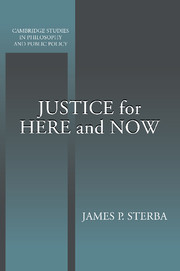Book contents
- Frontmatter
- Contents
- Acknowledgments
- 1 A Peacemaking Way of Doing Philosophy
- 2 From Rationality to Morality
- 3 From Liberty to Equality
- 4 From Equality to Feminism
- 5 From Feminism to Multiculturalism
- 6 From Anthropocentrism to Nonanthropocentrism
- 7 From Just War Theory to Pacifism
- 8 Conclusion: Justice for Here and Now
- Notes
- Bibliography
- Index
8 - Conclusion: Justice for Here and Now
Published online by Cambridge University Press: 08 January 2010
- Frontmatter
- Contents
- Acknowledgments
- 1 A Peacemaking Way of Doing Philosophy
- 2 From Rationality to Morality
- 3 From Liberty to Equality
- 4 From Equality to Feminism
- 5 From Feminism to Multiculturalism
- 6 From Anthropocentrism to Nonanthropocentrism
- 7 From Just War Theory to Pacifism
- 8 Conclusion: Justice for Here and Now
- Notes
- Bibliography
- Index
Summary
So what are the implications of the preceding chapters for a conception of justice for here and now? In Chapter 1, I defended peacemaking as a way of doing philosophy. With respect to moral and political philosophy, peacemaking requires that we seek the broadest justification possible for our philosophical perspectives and their practical requirements. Specifically, it requires that we (1) examine the possibility of grounding morality on the widely shared norms of rationality, (2) explore the possibility of achieving a practical reconciliation of alternative moral and political perspectives, and (3) be willing to modify or abandon our favored social and political perspective, either in whole or in part, should the weight of evidence require it. The rest of the book is an attempt to implement this peacemaking model of doing philosophy.
In Chapter 2, implementing the first requirement of a peacemaking model of doing philosophy, I took up the question of whether the norms of rationality require morality. I considered contemporary attempts by Kurt Baier and Alan Gewirth to show that rationality does require morality and discussed why they are unsuccessful. Building on the work of Baier and Gewirth, I then offered my own justification of morality and responded to both Hobbesian and Aristotelian objections that could be raised against it and to three contemporary objections that have been raised against it.
In Chapter 3, implementing the second requirement of a peacemaking model of doing philosophy, I examined the minimal morality of the libertarian's ideal of liberty and argued that, despite what libertarians claim, their ideal can be seen to support rights to welfare and equal opportunity through an application of the “Ought” Implies “Can” Principle and the Conflict Resolution Principle to conflicts between the rich and the poor.
- Type
- Chapter
- Information
- Justice for Here and Now , pp. 172 - 182Publisher: Cambridge University PressPrint publication year: 1998



